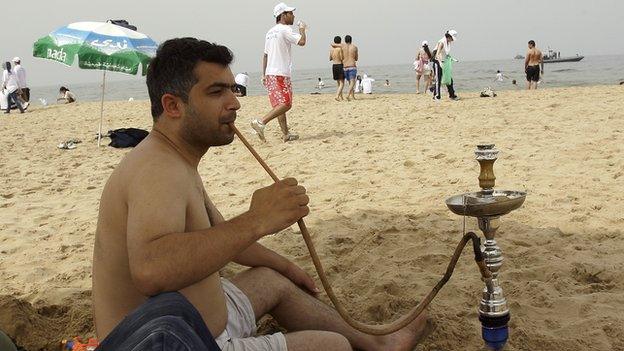Lebanon wracked by political dysfunction
- Published
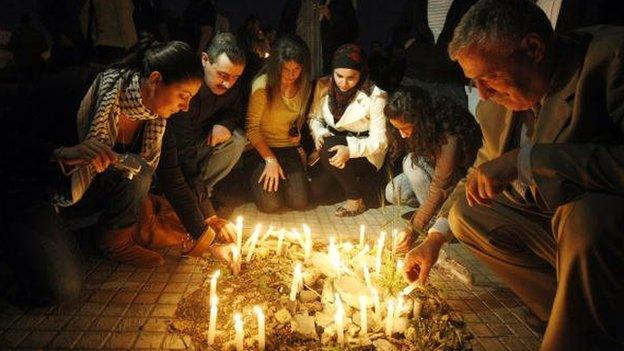
There have been many protests against power cuts
"LebanOFF, LebanON" was a catchy and successful media campaign, external launched by the Ministry of Energy in 2010 to hail a new age for electricity provision in the country.
And it struck a chord - after decades of power shortages, Lebanon was to be plugged in again.
But the slogan didn't live up to its promises and instead of more lights on, Lebanon has recently plunged even deeper into darkness.
And that's just one of the many problems plaguing the country and shutting the system down, making "LebanOFF" more than just an amusing slogan.
The most recent service disruption has to do with rubbish collection.
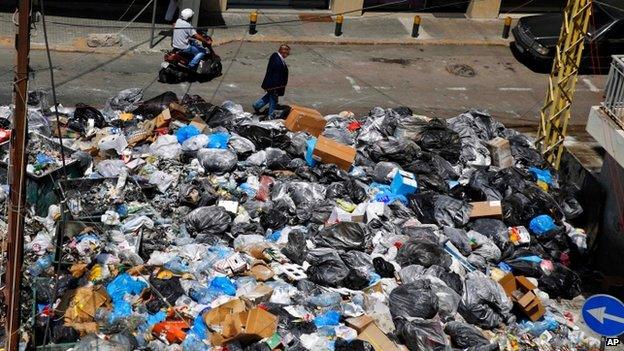
For over a month now, Lebanon has been drowning in rubbish
The main landfill site that used to take rubbish from the capital has closed after exceeding its capacity, and no alternative was sought or found to avoid the disaster. It prompted a civil society group to adopt the motto "You Stink", addressed to politicians.
In ruins
But none of these problem is new or surprising. They are the manifestation of a system in crisis.
Since the end of the 15-year civil war in 1990, little attention has been given to investment in infrastructure. The country was in ruins and so were basic services.
Other than in central Beirut, which was handed over to a private estate company, very few projects were implemented to improve the quality of services nationwide.
While consecutive governments didn't appear to care about long-term planning and projects, people relied on private and unofficial service providers.
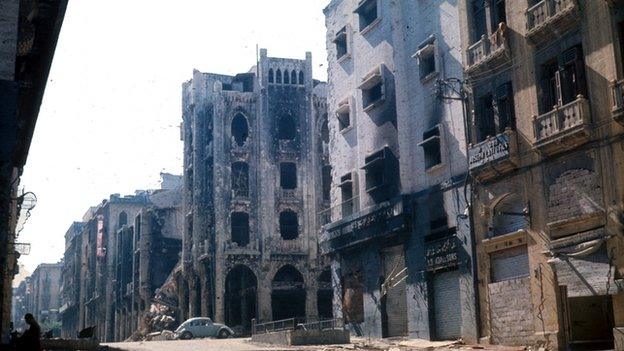
Beirut in 1980: Lebanon's civil war left the country in ruins
A parallel system emerged and the state never stepped in to live up to its responsibilities and address basic problems in a sustainable way.
And it isn't only about incompetence on the level of the day-to-day running of the country. The chronic problems have deeper roots.
27 attempts and counting...
A few basic facts are enough to show the level of dysfunction within the country. Lebanon has been without a president for more than 450 days.
The 27th parliamentary session to elect a president in August was as ill-fated as the previous 26.
Lebanon is caught in deep political divisions mirroring the regional fault lines. The MPs who are deeply allied to one player or another in the region, have been unable to decide on a president, a mainly ceremonial role, reserved for a Christian in a sectarian power-sharing system.
As the presidential elections stall, so does the parliament's work. The MPs have extended their own terms twice, dismissing calls for elections and legitimate representation.
They have been unable to agree on whether to continue legislating before voting for a president.
The result is paralysis in parliament for over a year.

Lebanon's political system
Political office in Lebanon is divided by a power-sharing agreement to ensure that the three major religious blocks - Shia, Sunni and Christian - are represented
The National Pact of 1943 established this division, declaring that the president must be Christian, the prime minister Sunni Muslim and the speaker of parliament a Shia Muslim
The president is chosen by a two-thirds majority of parliament, or 85 of the legislature's 128 members
Several attempts in parliament have failed to agree on a consensus president, some of them because of a boycott by MPs

Vicious circle
What remains is a lame government. Session after session, the cabinet meets to discuss whether its decisions should be adopted by consensus or simple majority in the absence of a president who has the right to preside over the cabinet sessions.
The circle of institutional paralysis is thus complete.
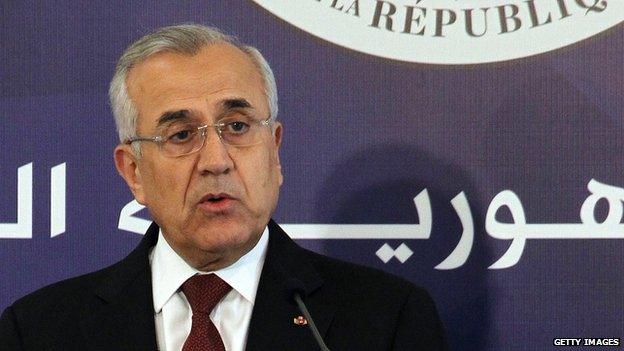
Michel Suleiman stepped down as president in May 2014 and has not been replaced
"This constitutional situation is practically the worst since the independence of Lebanon," says Mario Abou Zeid, a scholar from the Carnegie Center.
The paralysis has cost Lebanon, a heavily indebted country, a lot, including international aid and grants worth $1bn (£635m).
Recently the crisis has been spreading to other key positions in the country.
The mandate of the current commander-in-chief, another Christian position, was due to expire in September. After months of government squabbling over the appointment of a new commander, divisions couldn't be bridged.
The minister of defence decided unilaterally to extend the term of the current commander. In practice, it's a delay of the crisis, a one-year break before the same problem re-emerges.
As a senior journalist put it: "The extension is a sign of general failure. No-one won. It's the government that lost the most."
What he meant was that to resort to extending terms rather than appointing new leaders is one of the signs of the inability of the political class to overcome its differences and go on with managing state affairs even at a bare minimum.
'People are fed up with us'
Nevertheless, the extension infuriated a main political group, the Christian Free Patriotic Movement (FPM), who called for protests against the minister's decision.
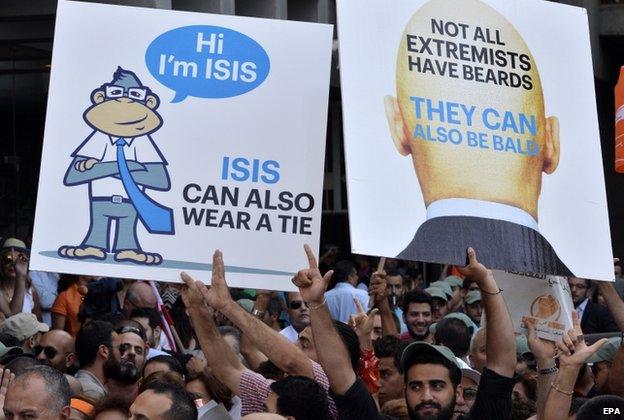
FPM supporters took to the streets protesting against "violations of the constitution", comparing politicians to the extremist group Islamic State, also known as Isis
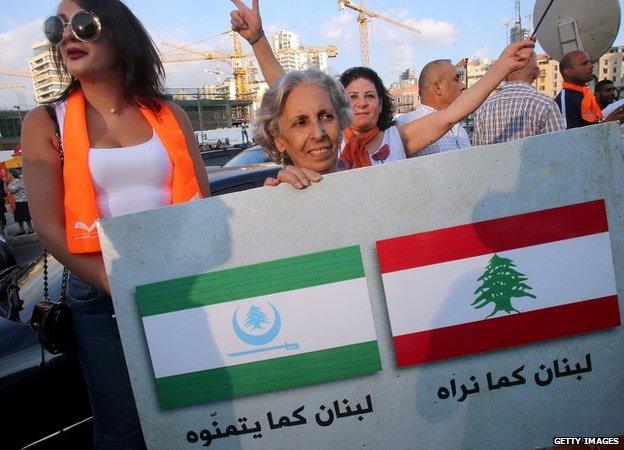
Another protester holds a placard saying "Lebanon as we see it" (R) and "Lebanon how they wish it to be"
The response of a minister from a rival party was dismissive.
"Neither our rivals nor ourselves are able at the moment to mobilise our bases. People are just fed up with all of us. They worry about the garbage on the streets, their salaries and other daily issues. They also know deep down that the main decisions are made outside the cabinet and even outside the country."
Resignation or evasion of responsibility? Whatever the case, many people seem to have developed a sort of apathy towards the rampant corruption and the incompetence of the political elite.
Since the beginning of the conflict in Syria, the outside world looked at neighbouring Lebanon as a country at risk of catching fire from the war next door.
Despite being hit hard by several security breaches thought to be linked to the situation in Syria, and a direct confrontation with Syrian opposition groups in a border town last August, Lebanon remains relatively stable.
It's the political situation inside the country that seems at the moment to be the most alarming.
- Published17 August 2015
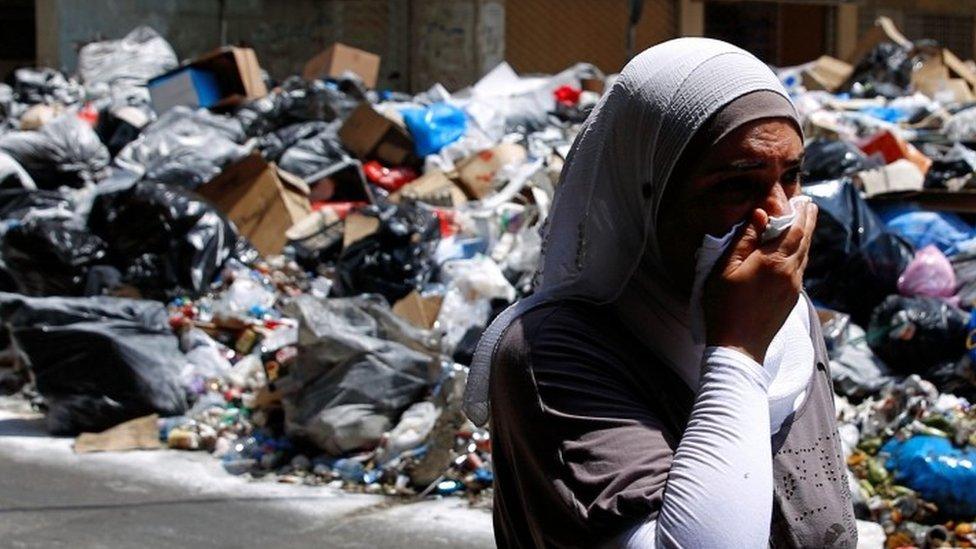
- Published28 July 2015
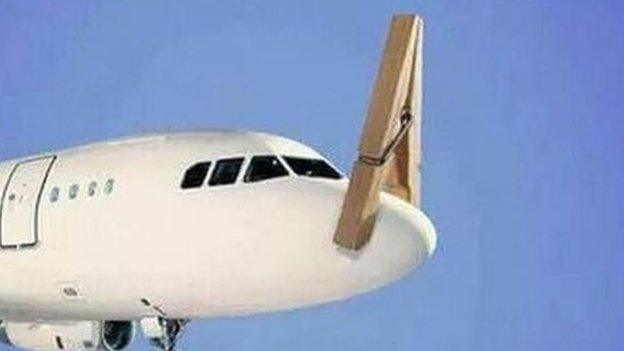
- Published10 January
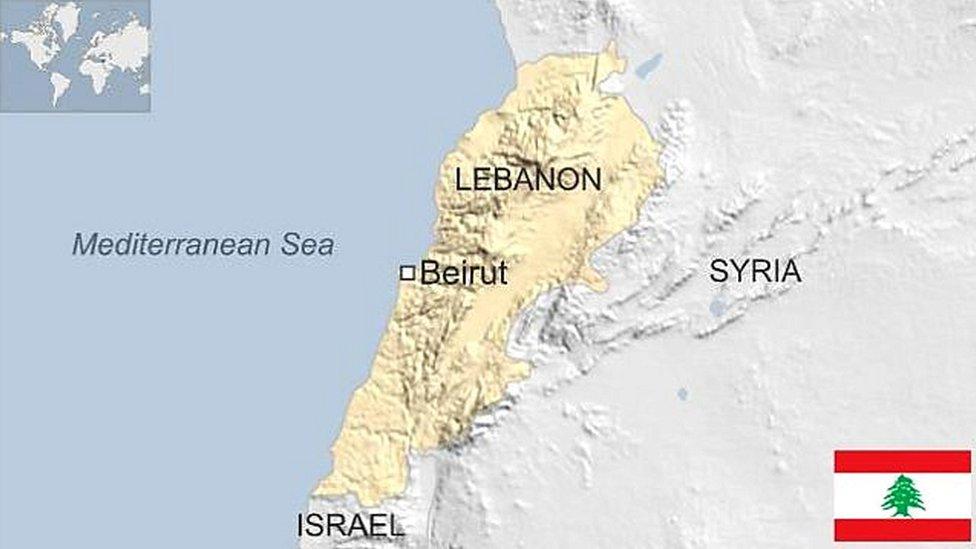
- Published4 November 2014
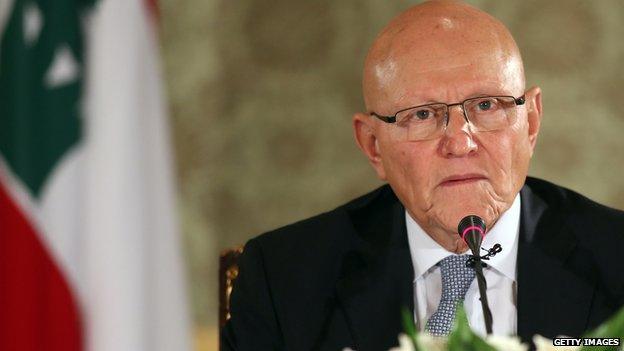
- Published1 May 2015
